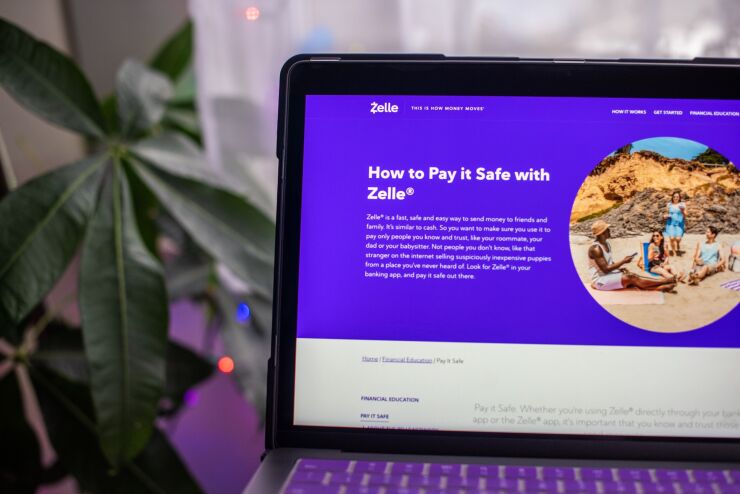
Early Warning Services has unveiled
In a pilot beginning in June for customers of the seven large banks that own EWS, Paze will pop up within a window on the website of participating merchants at checkout to streamline payments without entering any card numbers.
EWS aims to roll Paze out to about 150 million Visa and Mastercard accounts by this fall, and is "highly confident" many banks beyond EWS's owners will sign on later this year, said
But unlike other digital wallets, including Apple Pay and Google Pay, consumers can shop using Paze only if they are a customer of a participating bank, which could make mass adoption more challenging.
"That's part of our promise to the merchant community — that all data that comes through Paze goes through bank-grade security with a KYC program that's been validated by a bank," Anderson said.
Paze will pre-enroll all the payment cards a consumer typically uses. The first time a consumer of a participating bank checks out at a participating merchant site, consumers are prompted to select their default card, and they can also add or subtract cards within the wallet. Consumers can also access Paze and manage cards in it through their bank's mobile app.
Anderson bets that most banks will be motivated to promote Paze over existing third-party wallets like Apple Pay, Google Pay and PayPal because they will have more control over the experience. Unspoken is the likelihood that banks would prefer to route consumers away from Apple Pay, which reportedly charges banks 15 basis points for each transaction.
Paze isn't offering any separate incentives or rewards for consumers to sign up for checkout using the wallet, Anderson said.
"Do we need to bribe people to use this? I think the answer is no," he said. "I think we need to deliver a great consumer experience they feel confident in, that saves them time and makes their life slightly better."
Merchants will likely be motivated to support Paze because it's designed to prioritize and streamline the "guest checkout" experience used by about 70% of e-commerce shoppers, Anderson said.
"Most [third party] wallets have only been able to deliver relevance by taking you through the wallet experience, and in many cases that's the only way they create economics for themselves," he said. "But merchants have their own goals and needs at the checkout, and Paze gives merchants total flexibility to use the wallet and its data to solve whatever problem or priority they want."
In addition to Paze popping up at checkout, merchants have the option to add a Paze-branded checkout button, where it will coexist beside other payment options.
"Banks will continue to allow their cards to go into other third-party wallets, but those wallets are about creating relevance for the wallet brands, not the bank brand. We're about helping the banks create relevance for themselves with their cardholders," Anderson said.
Many community banks and credit unions hesitated to adopt Zelle in the first few years after its 2017 launch, out of concerns that they were simply supporting their competitors. But those concerns eventually faded in many cases, and Anderson expects that numerous banks beyond EWS's owners — Bank of America, Truist, Capital One, JPMorgan Chase, PNC Bank, U.S. Bank and Wells Fargo — will sign on within a matter of months.
"We're absolutely going to embrace and encourage small banks to participate," he said. "We have very specific strategies and programs around that, and we're going to embrace all merchants getting access to that." Anderson did not detail any specific incentives for smaller banks to participate.
Paze has built in various bulwarks against fraud, which has been an Achilles heel on Zelle for scams leveraging its instantaneous, irrevocable funds-transfers from bank accounts.
Paze is different, in that transactions are managed through Visa or Mastercard, not directly tapping users' bank accounts. To pay via Paze, consumers at participating banks will be required to claim their Paze account by logging into their bank account to validate their identity. Consumers also may validate their identity through a multifactor authentication process with the merchants, Anderson said.
"We'll leverage something you know and something you have to prove that you're legitimate, and if something goes wrong, the consumer has chargeback protection," Anderson said.
Although EWS's owners account for about 80% of all U.S. bank accounts, more than 4,000 other U.S. banks account for millions of other credit and debit accounts, representing a massive enrollment task.
Additionally, merchants will have to see value in the Paze wallet before they agree to give it space on their checkout page to promote it.
"All new payment types begin with merchant acceptance, and so far we're not seeing a strong incentive for merchants to prioritize Paze over existing checkout methods," said Richard Crone, a managing principal with Crone Consulting LLC.
But Anderson is optimistic that over time Paze will get broad bank and merchant participation.
"We're going to start with 150 million cards but we're going to expand very rapidly, and we're going to get them all," Anderson said.






